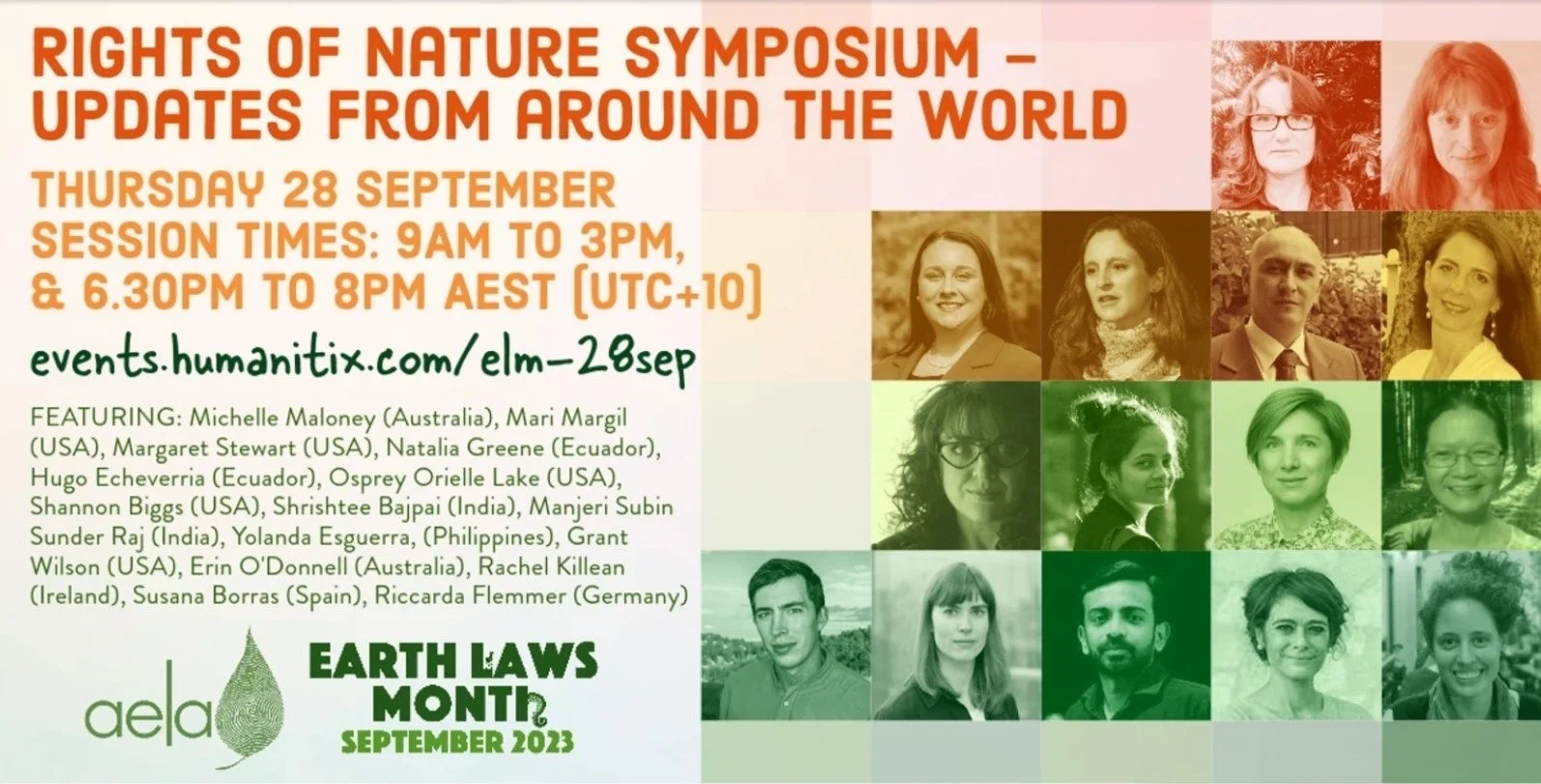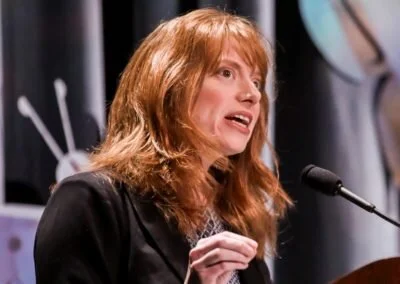On-Demand Webinars, Videos, and Presentations
This webinar will cover the Orange County rights of nature law, the history of the lawsuit, and the arguments being advanced by the Plaintiff-waterways.
The Ecuadorian Constitution has served as a thoughtful framework for this webinar to create a dialogue of knowledge. This event was an opportunity to broaden the knowledge we have about the constitutional protection of the rights of nature, particularly of fragile ecosystems and threatened species, as well as of the communities that depend on them, in the face of high-impact anthropic activities such as mining.
Our speakers conversed about the constitutional conception to address activities such as mining and its impact on the rights of nature, as well as the difficulties to guarantee these rights in technical legal procedures (such as Environmental Impact Studies) that potentially affect them. This event analyzed the issue with an inter-American approach, which includes the Advisory Opinion of the Inter-American Court on the environment and human rights.
On October 19th, 2021 CDER’s Thomas Linzey, and Wesley J. Smith of the Discovery Institute, engaged in a lively debate on the Rights of Nature. The debate was hosted by the Center for Climate, Society, and the Environment at Gonzaga University, and moderated by Professor Brian Henning.
The Center for Democratic and Environmental Rights (CDER) co-sponsored this webinar on June 23rd, 2021 with CEDENMA, Proteccion Animal Ecuador, and Estacion Cientifica Los Cedros. Presenters include our own Hugo Echeverria of CDER, Natalia Greene of CEDENMA, Elisa Levy of Los Cedros, and Lorena Bellolio of PAE.
This webinar will feature three experts – CDER’s Thomas Linzey, Dr. Bruce Lanphear, and Kim Konte, founder of the ground-breaking organization Non-Toxic Neighborhoods. The Center for Democratic and Environmental Rights (CDER) is partnering with Non-Toxic Neighborhoods (NTN) to launch a campaign to protect the health and well-being of children. The campaign is focused on working with communities across the United States to advance a model ordinance, the “Children’s Environmental Bill of Rights.” This webinar will examine threats to the well-being of children, and how people and communities across the U.S. can adopt local laws which protect the environmental rights of children and prohibit the violation of those rights.
CDER’s Senior legal Counsel, Thomas Linzey joined Thom Hartmann to give an update on the latest on waterways on Florida. Thomas has worked with Florida environmental leaders to begin collecting signatures to qualify a state constitutional amendment that would recognize legal rights of waterways in the state. The amendment would recognize the legally enforceable rights of all waterways across Florida to “exist, flow, be free from pollution, and maintain a healthy ecosystem.”
It has been a fifteen-year progression from theory into practice, with the first Rights of Nature law adopted in 2006, to where the rights of nature movement are today.
In N2K’s Evolution of the Rights of Nature Laws with Mari Margil of CDER, Mari discusses how the rights of nature have evolved, from the first law in Pennsylvania, to today including constitutions, court cases, and local and national laws in Ecuador, Colombia, and Florida and other places.
Doris Ragettli, of the Rights of Mother Earth, and Pella Thiel of the End Ecocide Sweden and Lodyn joined the Center for Democratic and Environmental Rights for our “Global Developments in the Rights of Nature: International Agreements” webinar on May 11th. These two have done important work on behalf of the rights of nature and shared some insightful lessons on how to advocate at the international level.
On May 4th, CDER presented a webinar on the Moon, plans for human exploration and exploitation along rising concerns with the potential impacts on the lunar environment. The Declaration of the Rights of the Moon was highlighted by four of its drafters, who also presented: CDER's Mari Margil and Dr. Michelle Maloney, Dr. Alice Gorman, and Thomas Gooch.
This webinar delved into the rights of nature in tribal law and governance. Frank Bibeau, Attorney for the White Earth Band of Ojibwe and with Honor the Earth, and Guy Reiter, Executive Director of Menikanaehkem, joined us as guest speakers to discuss the journey of tribal nations to protect the rights of nature, as well as the direction within the tribal communities to protect Earth as a sovereign being.
The April 8th Rights of nature webinar focuses on the first Rights of nature law passed in Canada, to protect the MagPie/Meteshekau Shipu River. We have two special guest speakers for this event: Pier-Olivier Boudrealt and Yenny Vega Cardenas.
Thomas Linzey, our Senior Legal Counsel, focuses on the concept of legally enforceable Rights of Nature and traces the development of Rights of Nature laws and court decisions around the world. This webinar is for groups in the U.S. interested in learning about the Rights of Nature movement, and how to implement it in their own town or city.
Thomas Linzey is the Senior Legal Counsel at the Center for Democratic and Environmental Rights (CDER). The event was part of CDER’s 2020 College Tour, titled “Who Speaks for the Trees: The Movement for the Rights of Nature”. This was hosted in partnership with the University of Toledo Legal Institute of the Great Lakes and the Environmental Law Department.
Bioneers Keynote - Now available! Watch CDER's Mari Margil and Thomas Linzey – Changing Everything: The Global Movement for the Rights of Nature - at the 2020 Bioneers Conference. With Kenny Ausubel providing introductions, Mari Margil and Thomas Linzey highlighted breakthrough milestones in legal natural rights protections in tribal nations, communities, and countries around the world. As stated in a press release, they “explain how advancing the rights of nature in legal codes and constitutions can lead to a radical transformation in humankind’s relationship with the natural world”.
The first rights of nature law in Florida was overwhelmingly approved by voters on Election Day! Hear from the leaders of the campaign and the growing movement in Florida on our monthly webinar series, Global Developments in the Rights of Nature. In November 2020, CDER focused on the State of Florida, in the United States, with presenters Chuck O'Neal and Joe Bonasia of the Florida Rights of Nature Network, a key partner organization of CDER.
A big election night win in Orange County Florida, with nearly 90% of voters voting "yes" to recognize the rights of rivers and waterways. Water is everything in Florida and industrialization is harming water ecosystems across the state. Now, however, rivers in Orange County have the right to exist and the right to flow. Mari Margil joined Thom to explain what it means to Florida, and how nature can have rights.
In September 2020, CDER's Thomas Linzey, Esq., gave a keynote presentation titled "Advancing Rights-Based Protections for Nature: Proposing, Drafting, and Adopting Rights of Nature Laws". Geneva E.B. Thompson, Associate General Counsel for the Yurok Tribe also presents on the journey of the Rights of the Klamath River. This includes the history of the Yurok worldviews, as well as the rights of the Klamath River Resolution and the importance of this body to local species.
This panel, moderated by Thomas Linzey, features Guy Reiter, Executive Director of Menikanaehk EM, Inc., Menominee Indian Organizer. Guy presents on how nature is intrinsically connected to tribal identity, and how to protect nature is to protect their sovereign right to exist and be seen. His work with the Menominee tribe, Menominee River, and community is a true success story.
On September 21, 2020, Pachamama Alliance Co-founders Bill and Lynne Twist were joined by international Rights of Nature experts and advocates Natalia Green, Co-founder of Global Alliance for the Rights of Nature, and Thomas Linzey, Senior Legal Counsel for the Center for Democratic and Environmental Rights, for a conversation as part of Resilience and Possibility in These Times.
The search for safe drinking water has become a trending topic in the debate on climate change. Resources are growing scarcer, but communities are rising to the occasion to develop means of protection. In Mumbai, India, a right-to-water campaign is having success in getting thousands of tap water connections into informal dwellings. In West Virginia, the coal and fracking industries’ political stranglehold has mobilized neighborhood groups to fight back, protecting their streams and groundwater from toxic waste. Our own Thomas Linzey provides his expertise in the importance of their validation within justice systems.
Watch the recording of our September webinar on the rights of nature movement in the Philippines. We were joined by National Coordinator Yolanda Esguerra and Attorney Mario Maderazo of the Partnership Mission for People's Initiatives (PMPI).
Live on YouTube now: This month, our Rights of Nature webinar focused on the rights of nature in India, where courts have recognized rights of the Ganges River and other ecosystems. Presenter Shrishtee Bajpai, of the organization Kalpavriksh in Pune, India, discusses recent developments with the rights of nature, including the rights of rivers.
The recording of our most recent webinar — Rights of Nature in Australia — is available to watch on YouTube now, featuring Western Australia Member of Parliament Diane Evers, and Michelle Maloney of the Australian Earth Laws Alliance and the Center for Democratic and Environmental Rights.
On June 18, CDER and the Florida Rights of Nature Network hosted a one-hour introductory webinar on the Rights of Nature and advancing Rights of Nature laws in the State of Florida.
Our June 2020 webinar focused on Ecuador, with an excellent presentation by Attorney Hugo Echeverria, who is based in Quito and who works with CDER. He spoke about the Rights of Nature constitutional provisions in Ecuador, recent court cases on Rights of Nature, and future steps for implementation.
On May 7, we held our first monthly webinar on the Rights of Nature. Presenters Mari Margil and Thomas Linzey discussed the origins of Rights of Nature laws and how the movement to recognize rights of the natural world is building through lawmaking and court decisions in countries across the globe.






































